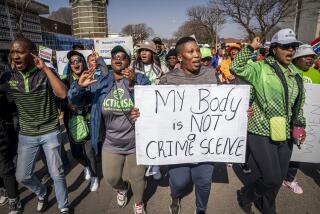SOUTH AFRICA : Inkatha Members on Trial, and So Is the Organization : Murder proceedings further tarnish the group’s reputation as it enters important power-sharing negotiations with the government.
- Share via
ALEXANDRA, South Africa — Long after midnight, the mourners at Jane Ramokgola’s funeral vigil were still singing, serenading residents of this impoverished township with African National Congress “freedom songs.”
In a jumble of shacks only a few blocks away, five Zulu supporters of the ANC’s bitter rival, the Inkatha Freedom Party, gathered their guns and marched through the night, apparently determined to put a stop to the music.
Coolly, the men walked into two small rooms of a township house and, one by one, killed 13 people and wounded 17.
The March 27 executions marked one of more than a dozen massacres at funerals or on commuter trains in the last year in South Africa--attacks that have shocked and frightened blacks but resulted in only a few arrests and, so far, no convictions.
But the attack on Jane Ramokgola’s funeral vigil turned out differently. And it has returned to haunt Inkatha at a crucial time for the party, which hopes to carve out an important role for itself at constitutional negotiations scheduled to begin Dec. 20.
The police made five arrests in the case. But more important, the attorney general assigned a senior state prosecutor to give the case what he called “absolute priority” in hopes of countering growing suspicions that the police are either unable or unwilling to put a stop to the violence.
And now, less than seven months later, five Inkatha supporters already are on trial for murder.
The proceedings, which began in Johannesburg in mid-October and are expected to continue through February or March, mark the latest setback for Mangosuthu Gatsha Buthelezi’s Inkatha Freedom Party. And as Inkatha enters the first round of formal constitutional negotiations with the government, the ANC and other major parties, Inkatha’s reputation has been badly tarnished.
Inkatha leaders strongly deny any role in the Alexandra massacre. They also say suggestions that their party is embattled have been concocted by newspapers that favor the ANC, and they claim an ever-growing membership of 2.2 million, including 200,000 whites.
But public opinion polls suggest declining support for Inkatha in the townships around Johannesburg, where supporters of Inkatha and the ANC have traded bloody attacks that have left more than 2,500 dead in the last year.
Inkatha’s troubles began in July when the government admitted police payments in support of Inkatha rallies. That scandal, dubbed “Inkathagate,” seemed to verify what many had suspected all along: that the government’s known fondness for Inkatha was being backed up with secret payments.
The government said the payments ended in 1990, and Inkatha repaid the money. But the liberal Weekly Mail newspaper, which broke the story, reported last week that police made another secret disbursement to pay for an Inkatha rally earlier this year.
Perhaps the most devastating blows to Inkatha, though, have come in two South African courtrooms, 500 miles apart.
In Pietermaritzburg, in Natal province, a judge is hearing evidence against a white police captain and his black colleagues, who are accused of killing 11 people at a 1989 funeral vigil in Trust Feeds. Witnesses have testified that the police captain started the massacre to support the local Inkatha leader but attacked the wrong house and killed Inkatha supporters by mistake.
However, it is the trial in Johannesburg that carries the most potential damage for Inkatha, which portrays its supporters as the innocent victims of township violence.
The five defendants--four Inkatha members as well as the leader of the organization’s youth brigade in Alexandra--have pleaded innocent. But dozens of survivors have identified the defendants, who they said fired at close range.
More to Read
Sign up for Essential California
The most important California stories and recommendations in your inbox every morning.
You may occasionally receive promotional content from the Los Angeles Times.














